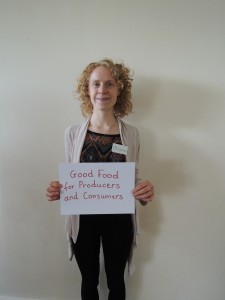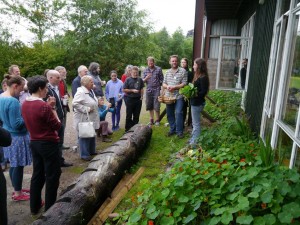This blog post by Oriane Brunet is the second of a series of reflections written by participants of the Food Leadership Programme, organised by Nourish from the 12th – 17th of July.
I had the great pleasure of taking part in Nourish’s first Food Leadership Programme from 12th to 17th July 2015. I was one of the 26 participants from very diverse backgrounds and occupations – young graduates, city dwellers, growers, activists, cooks, teachers… What brought us together was our shared interested in food as a means to make people happier and healthier and to take care of the environment. The facilitators of the course established an open and respectful space where we could all listen to and learn from each other as equals. So, what did we get from it?
A history of power plays
We retraced the history of food in Scotland since the age of hunter-gatherers. Technological advances in agriculture, transport and industry have repeatedly transformed the types of foods produced and eaten; these innovations are driven by political and economic interests, and affect society as a whole. For example, the Scottish fishing fleet expanded in the 1800s as British owners fed herring to slaves on sugar cane plantations in the West Indies. At the same time, Britons acquired their sweet tooth: in 1700 the average person ate 4 pounds of sugar a year, up to 47 pounds in 1870!
This timeline revealed that challenges, creativity and inequality around food in Scotland and the rest of the world have always existed, often placing the health and freedom of large parts of the population after the interests of the powerful few, and encouraging people to defend themselves and propose better ways of doing things.
The parts and the whole
Through discussions and role plays, we explored the concept of food sovereignty and how it can underpin a better food system in Scotland. In a nutshell, food sovereignty is about food for people (rather than profit). It values food producers, localises food systems, makes decisions locally, builds knowledge and skills, and works with nature. The strength of food sovereignty is that it pulls together the many threads of the food web (consumers, producers, the environment, culture) and highlights the mutual benefits that food can provide in society.
Today, millions of people around the world are actively engaged in making food fair and sustainable, and we had the chance to speak via Skype to leaders of The Stop social food hub in Canada, the Caribbean Farmers’ Network, Terre de Liens in France, and The House of Food in Denmark. Whether in Scotland or abroad, no one person or project can tackle all the problems related to food. But what matters is that the principles of food sovereignty are embodied in individual projects, which each play a part in achieving the goal of good food for all.
Spaces for hospitality
Throughout the programme, we practised active listening and empathy as essential skills in order to work towards positive change with all sections of society. We believe that anyone can lead this change by hosting inclusive conversations around food which welcome creative strategies and positive narratives. Let us identify common goals and values between different parties and dare to envision the future we want: one where people can feed themselves in ways that are socially, culturally and environmentally appropriate.
Personally, the Food Leadership Programme has given me the confidence that my everyday efforts to promote better food are worthwhile because they are part of the bigger movement for food sovereignty. Collectively all the many fantastic projects which already exist in Scotland and beyond are the seeds and seedlings of the future. So let’s get on with it!

